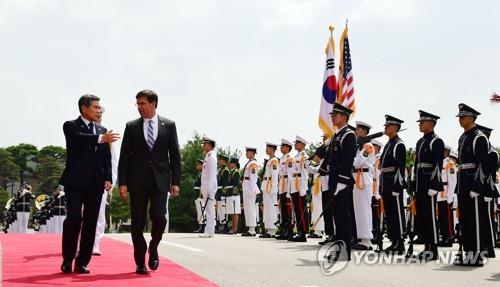Esper raises concerns over S. Korea’s decision to end intel-sharing pact with Japan

South Korean Defense Minister Jeong Kyeong-doo (L) speaks to U.S. Secretary of Defense Mark Esper in Seoul on Aug. 9, 2019 (Yonhap)
Seoul: U.S. Secretary of Defense Mark Esper voiced concerns Friday over South Korea’s decision to terminate the intelligence-sharing pact with Japan when he spoke by phone with Defense Minister Jeong Kyeong-doo, a ministry official said.
“Our minister explained to Esper detailed backgrounds that caused South Korea to make such a decision, including Japan’s insincere responses to South Korea’s diverse efforts (to resolve pending issues),” the official told reporters.
“While expressing concerns over a possible limit to sharing intelligence, the U.S. secretary stressed the importance of continued security cooperation and close communication among the three nations,” the official added.
On Thursday, South Korea said it will end the General Security of Military Information Agreement (GSOMIA) amid Japan’s export restrictions on South Korea in apparent retaliation against Seoul’s Supreme Court ruling on wartime forced labor.
The pact will expire in November.
Esper has voiced support for the pact, saying last month that it is “key to us in our common defense, if you will, against North Korea,” and raised the issue during his meeting with Jeong earlier this month in Seoul.
As the first military pact between the U.S.’ key allies after Korea’s liberation from Japan’s 1910-45 colonial rule, the GSOMIA is also regarded as a key mechanism for security cooperation among Seoul, Washington and Tokyo.
Earlier in the day, the U.S. Department of Defense issued a statement and expressed “our strong concern and disappointment that the Moon Administration has withheld its renewal” of the agreement.
Announcing the decision, the presidential office Cheong Wa Dae said that the pact does not conform to Seoul’s national interest, as Japan’s trade curbs caused a “grave change” in security cooperation circumstances between the two nations.
Japan cited “security problems” when it announced its decision to remove South Korea from the so-called whitelist of its trusted trading partners earlier this month. The move came after Japan imposed tighter curbs on exports to South Korea of three key industrial materials on July 4.
Joint Chiefs of Staff Chairman Gen. Park Han-ki and other military leaders also plan to explain details regarding the withdrawal decision to U.S. Forces Korea Commander Gen. Robert Abrams and their counterparts, according to a military source.
Asked if South Korea will exchange intelligence with Japan until November in accordance with the GSOMIA, the ministry official said that it will do so “if necessary.”
After the termination of the bilateral pact, Seoul and Tokyo may share their intelligence under the framework of the Trilateral Information Sharing Arrangement (TISA), a three-way arrangement among Seoul, Washington and Tokyo, signed in December 2014, according to the official.
YONHAP























































